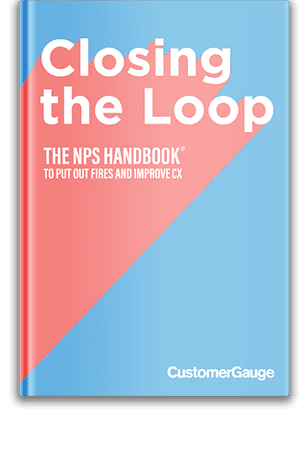4 Ways to Close the Loop with Net Promoter®
by Ian Luck
Net Promoter Score® is just a small piece of the modern NPS puzzle. In The Ultimate Question 2.0, Fred Reichheld and Rob Markey discuss how companies use Net Promoter Systems grow their bottom line. A big part of this process is “closing the loop” with customers, which is where the value of a Net Promoter System really shines.
But just what is “closing the loop”?
Closing the loop allows companies to rescue detractors quickly from the competition while also ensuring a great customer experience. As you know, when customers provide feedback via the Net Promoter question, they are designated into three buckets: promoters, passives and detractors.
The beauty of a Net Promoter System is that it allows you to not only evaluate which customers fall into these buckets, but also to act on the information given by, say, a detractor, to rescue them from detracting totally from your company or product. The process of follow-up with customers after receiving feedback is called “closing the loop”.
Closing the loop is a vital step in any successful NPS program. As such, we’ll walk through a few best practices for ensure you’re Closing the Loop like an NPS Leader.
1. Set Up Workflows and Case-Tracking
Nothing’s more frustrating than being juggled back and forth between customer service representatives. However, this happens all too often. Closing the loop is all about speed. The first step to smoothing things over with your customers is making sure they are talking to the right people.
When your customer completes the survey, your Net Promoter System should automatically open a case based on their response. For example, when the customer ticks the “Please contact me” box on the survey or if they provide an NPS score in a specific range (i.e. 0-6).
Not only does implementing workflows improve response times to customers, but it also improves work processes and morale among staff by reducing confusion.
2. Use Real-Time Fire-Fighting
Timeliness plays a major factor into whether a customer is satisfied with a service—and is often one of the biggest customer complaints. When it comes to delivering superior service, it’s important to not only be able to receive customer comments in real-time, but to engage with customers in real-time as well. Therefore, always think of feedback as more of a conversation than a reactionary measure.
Net Promoter Systems use tools like fire-fighting to automatically manage customer issues. Alerts are sent directly to employees based on the pre-set workflows and case-tracking. In terms of industries like multi-channel retail, commercial finance, food & travel, the difference this type of quick follow-up offers is quite substantial.
3. Say Thank You—And Mean It
It’s time-consuming, but going the extra mile in your follow-up “thank you” emails can do a lot. Sending simple “thanks for taking our survey” is not helpful to anyone. Follow-up emails should always address specific comments you received and what you’re doing to be better the next time.
Sometimes, it just takes emails like these to show us that you are listening to your customers and remedying their concerns:
4. Activate Your Promoters
Closing the loop isn’t all about appeasing your detractors. Promoters are also worthy of your follow-up. Remember, these people are your brand advocates, and it pays to give them some attention. So, as much as following up with detractors can save your business, the same goes for your promoters.
Activating promoters can be done through a number of initiatives, including:
Reaching out with similar thank you emails as a follow-up for taking your survey
Implementing loyalty programs to encourage continued relationships (Happy Birthday Sarah! Here’s 25% off!)
Offering benefits for “referring a friend”
Celebrating milestone (“Hey Steve, Here’s to 10 more years with us!”)
These are just a few ways to close the loop with your customers. If you want to learn more about best practices for closing the loop, check out CustomerGauge's NPS Handbook® on the topic below.
Blog Home









